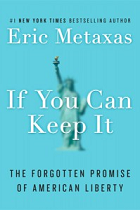
Viking, 2016
Barnes & Noble:
Hardcover $17.94
Metaxas’ golden triangle of freedom
by Sam Webb
In If You Can Keep It: The Forgotten Promise of American Liberty, author and public intellectual Eric Metaxas is concerned that the American people have forgotten the essence of our “more perfect union.” Metaxas is concerned that America today might not be worthy of future Memorial Day celebrations. He recalls in his Introduction the story of Benjamin Franklin — the story that serves as the inspiration of the name of this book — emerging from the Constitutional Convention one day when a woman asks him whether the young country is a republic or a monarchy. Franklin replied, “A republic, madam – if you can keep it.” This is the point of the book: the American experiment is exceptional and must be kept for future generations. He writes, “each of us who call ourselves Americans has a great duty to keep that promise [of America] – and if we don’t do our duty toward keeping that promise, our nation will soon cease to exist in any real sense.”
That main argument runs as a thread through the seven chapters of Metaxas’s book, which offer insight into the promise of America, a call to hold fast to the promise, while also casting a vision for a promising American future. Metaxas reminds the reader in Chapter One of the fundamental “idea of American liberty, which might also be called self-government.” This is the promise of America. In order to best keep the American promise, Metaxas prescribes that Americans “behold ourselves afresh” and perceive the strangeness of American liberty in political history.
Metaxas offers instructive insight in Chapter One when he contrasts the liberal and conservative misunderstandings of freedom. For the liberal, he writes, “American freedom is when freedom – or liberty – is confused with [moral] license.” For the conservative, however, the false hope is that an American understanding of liberty and self-government is the natural condition of mankind. Both of these are misunderstandings, Metaxas argues, because the liberal does not reckon with moral reality and the conservative understates the need for supporting structures of self-government.
Further, the inherited experiment of American liberty has “nothing to do with jingoism and nationalistic chest beating” — contra current political zeitgeist — but rather all to do with the goodness of the people called Americans. Metaxas persuasively argues that self-government – American liberty – is not only a civil government concept, but is primarily a matter of personal ethic. “True freedom must be an ‘ordered freedom’” and this ordered freedom grows from the bottom-up, a culture to a government, rather than from the top-down.
Metaxas offers a paradigm for thinking about the cultural milieu needed to sustain American liberty in Chapter Two. He borrows a concept from the Christian public intellectual Os Guiness: The Golden Triangle of Freedom, or freedom, virtue, and faith. This triad of cultural goods is mutually reinforcing. “Freedom requires virtue; virtue requires faith; faith requires freedom.”
In a secular age, the idea that freedom requires virtue and that virtue requires faith is not well-received. But, the liberal misunderstanding of freedom–freedom to moral license–disintegrates the virtuous anchor of the Golden Triangle. A lack of virtue leads to a greater need for masters. Metaxas fills the pages of this book with quotes from America’s founders making this point, a point lost on the majority of Americans today.
To poke the bear even more, Metaxas argues that virtue requires faith, or more explicitly, religion. The root of virtue in a man’s life is his religion. Metaxas writes, “[Today], everyone seems to know that helping the poor is important … or that slavery is wrong, or that being good stewards of the environment is important, but what we have completely forgotten is that these ideals all stemmed from the Judeo-Christian tradition in the West. We seem to think that whatever virtues we do possess arose by themselves. History shows this to be false.” False, indeed. Humanity is incurably religious and the religious context that spawned American liberty was specifically a Judeo-Christian context filled with its moral imperatives.
So, then, we come full triangle to freedom. Virtue and faith result in a self-governed people, a civil government constrained in its power because the people are governed by higher ideals and authority. Metaxas reminds us that faith and freedom are not bitter enemies, as thought in the 18th century France and 21st century America. Central to American freedom is religious liberty.
Religious liberty, imperiled in various ways today, was the genius of the American founding. The founders recognized the federal government should not dictate dogma, but rather facilitate freedom of faith and practice. The civil government judges behavior, not beliefs. Religious liberty has facilitated a flurry of faith communities committed to their God which serve to reinforce the virtue and freedom necessary for our thriving republic all these years. Religious liberty is the American first freedom. “We the people” must resolve to protect this freedom for the good of our collective American soul.
- Hits: 12866
 Hardcover, 352 pages. Basic Books, 395 pages
Hardcover, 352 pages. Basic Books, 395 pages by Robert A. Dahl
by Robert A. Dahl